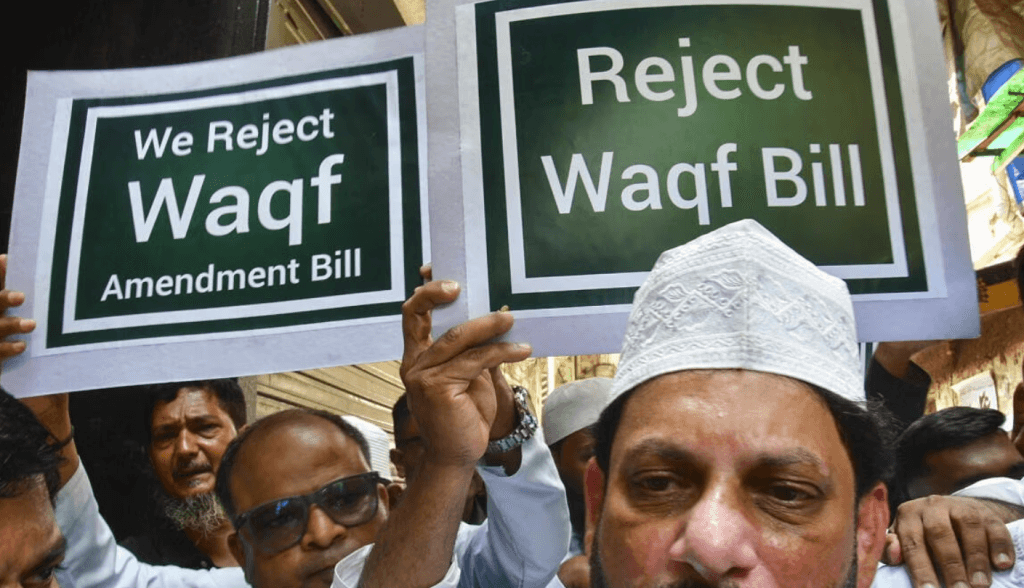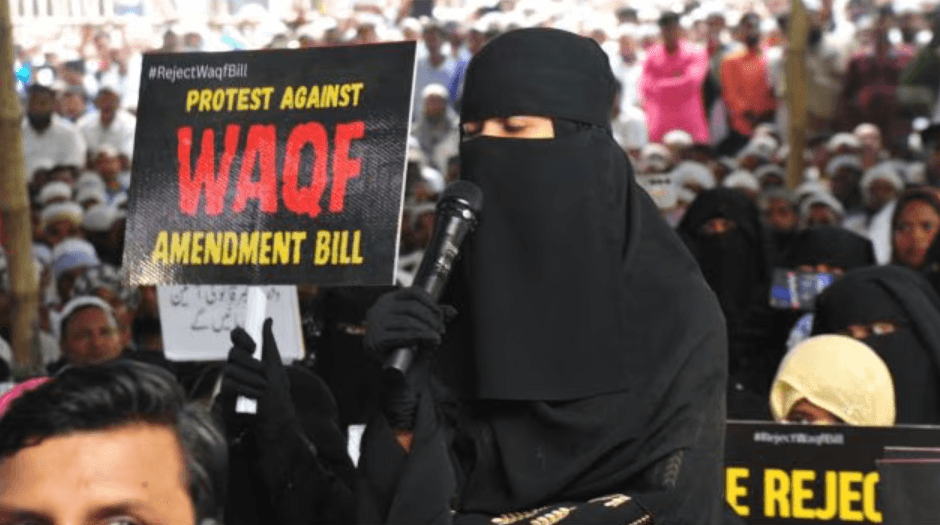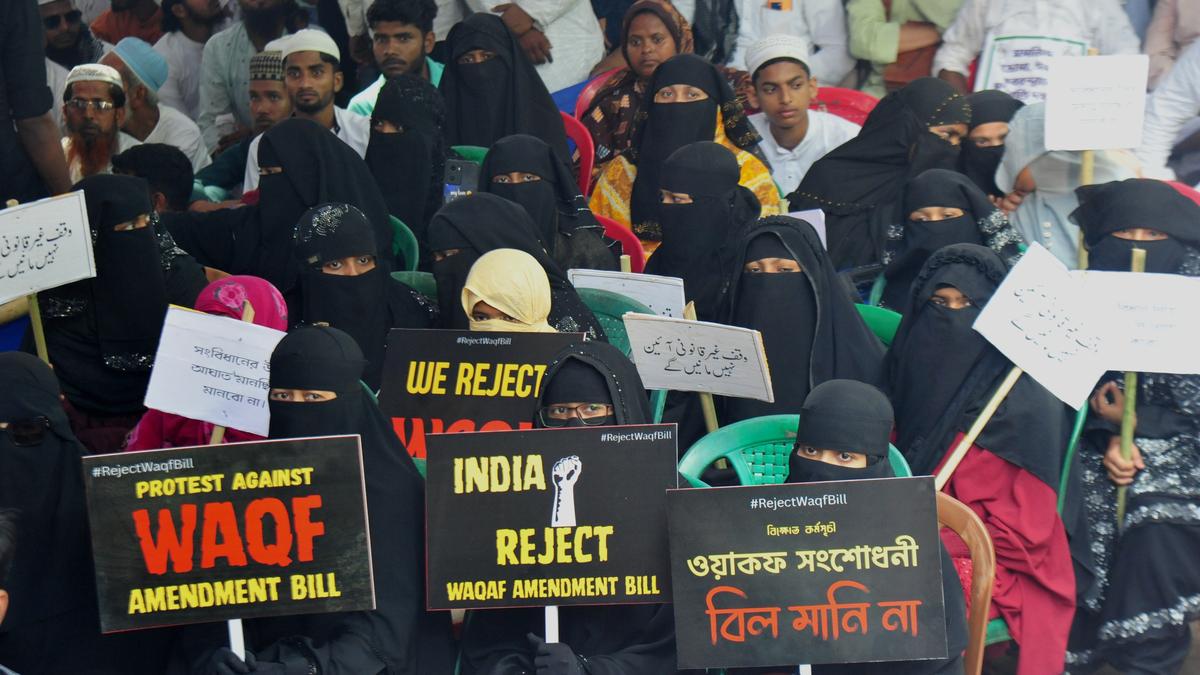“How will minorities not accept this law? It’s the Parliament’s law; everyone would have to accept it,” Home Minister of India, Amit Shah’s voice was heard roaring in the early hours of 2nd April all around the Lower House, accompanied by the clatter of allies and opposition alike.
Outside, around 1,500 km away, in Bengal, anxiety and fear among people over the loss of acres of property that had been their source of refuge and livelihood for years were beginning to erupt into violent protests in yet another seemingly ‘neutral,’ legal act that was ultimately digging the pit of distrust and communal hate deeper and deeper.
The context of Waqf Act
The Waqf (Amendment) Bill, 2024, was introduced in the Lok Sabha (the lower house of India’s Parliament) on August 8, 2024, by the Union Minister of Minority Affairs and BJP member Kiren Rijiju. While the bill proposed several amendments, the most controversial one was its provision to grant greater control to the government, particularly district administrators, over the management of Waqf properties (property—either movable or immovable—that Muslims permanently donate for religious or charitable purposes).
Under the original Waqf Act, Waqf Tribunals held final authority in matters related to waqf property. However, the passage of this bill revokes the finality of decisions made by these tribunals, opening the door for appeals and further legal scrutiny. Additionally, the bill proposes the inclusion of non-Muslims on the boards that manage Waqf endowments, thereby expanding the government’s role in validating land holdings.
The bill was referred to a Joint Parliamentary Committee for a detailed examination and was subsequently passed in both houses of Parliament by a substantial majority. The committee argued that the bill would enhance transparency and accountability in the handling of waqf properties and help streamline property disputes.
Reactions and protests
Unsurprisingly, the passing of the Waqf (Amendment) Bill, 2024, has faced significant resistance from Muslim communities across India. The bill has been criticised for allegedly violating the property rights and religious freedoms of Muslims. Moreover, the decision to empower district collectors to make final decisions on disputed Waqf properties has raised concerns about the erosion of Muslim control over their assets.

Concerns began to mount in early November 2024, when Fazlur Rahim Mujaddidi, the General Secretary of the All India Muslim Personal Law Board (AIMPLB), opposed the bill, stating that over 3.66 crore Muslims had submitted emails voicing their opposition. He argued that the amendments would undermine the authority and autonomy of the Waqf Board. In March 2025, the AIMPLB announced a nationwide agitation against the bill, organising large sit-ins in front of state assemblies in cities like Patna and Vijayawada.
Multiple petitions challenging the bill’s constitutionality were also filed in the Supreme Court, with hearings scheduled for April 16, 2025.
However, the protests escalated dramatically after the bill’s passage in April 2025, particularly in Murshidabad district, West Bengal, which saw some of the most intense unrest. Mass protests spread across cities such as Kolkata, Chennai, and Telangana. The most severe unrest occurred in Murshidabad, where protests, which began on April 8, quickly escalated into violence, culminating in tragedy on April 12.
What is left is a deeply divided society, steeped in communal hatred. The Waqf Amendment Act follows a similar pattern. Its language itself suggests the inability of the Muslim community to regulate its property, thus deeming the intrusion of non-Muslims (not administrative officials, mind you, but individuals who specifically do not belong to the Muslim community) necessary for its regulation
In Dhulian, Shamsherganj, two members of the same family, Hargobind Das and his son Chandan Das, were brutally hacked to death, while Izaz Ahmed Sheikh, a 17-year-old youth, sustained bullet injuries from police firing on April 12 in Suti.
In response, the authorities swiftly imposed Section 144 to restrict gatherings, suspended internet services, and deployed central forces as ordered by the Calcutta High Court, significantly curtailing citizens’ freedom.
An act of reform or disempowerment
A cursory look at the act’s stipulations and the justifications provided by the Centre, especially by the Minority Affairs Minister Kiren Rijiju, who describes the act as “Pro-Muslim,” suggests that it aims to regulate and reform the functioning of the Waqf Board to increase accountability and “prevent misuse of property.”
It is no new revelation that a slew of legislations, from the revocation of Article 370 in Jammu and Kashmir to the Citizenship Amendment Act (CAA), 2019, have been attempts to foster divisive politics and communal hatred among communities.
However, it is important to recognise that this legislation, like all other legislations, should not be considered in isolation. Instead, a broader framework—which includes the current socio-political paradigm of India, heavily influenced by the ideologies and politics of the ruling party—must be considered when analysing the Act.
Thus, it must be analysed within the larger context of the persecution of Muslim communities in India that has intensified since 2014. It is no new revelation that a slew of legislations, from the revocation of Article 370 in Jammu and Kashmir to the Citizenship Amendment Act (CAA), 2019, have been attempts to foster divisive politics and communal hatred among communities.
Historically, laws like the CAA and cow protection legislation have gained prominence, particularly during election seasons, to secure majoritarian votes. Every time a law targeting the practices of a particular religion is introduced, critics astutely point out its polarising nature and tendency to make communities hyper-aware of their religious differences.
Marginalised communities often resist out of fear, which can quickly turn violent due to the sensitive nature of the issue, leading to “official” retribution by the authorities. The resulting riots often provide justification for controlling or regulating the freedoms and rights of minorities, creating pockets of hatred in regions where such tensions previously did not exist.
What is left is a deeply divided society, steeped in communal hatred. The Waqf Amendment Act follows a similar pattern. Its language itself suggests the inability of the Muslim community to regulate its property, thus deeming the intrusion of non-Muslims (not administrative officials, mind you, but individuals who specifically do not belong to the Muslim community) necessary for its regulation. No such laws have been introduced for boards or trusts of other religions.
Furthermore, the violence that has ensued has seen authorities heavily biased against the Muslim protesters. The imposition of Section 144 in Muslim-majority districts further highlights the authorities’ tendency to resort to punitive action rather than reformative action—an approach that has motivated most such bills in India.
Waqf and women
So far, the only redeeming property of the Act seems to be its push towards the inclusion of women. The Act mandates that two Muslim women must be included as members in both the Central Waqf Council and the State Waqf Board. However, a more profound look at the historical treatment of Muslim women by the government of India highlights the tokenistic role they are given within the system.

Laws such as the Triple Talaq law and the Hijaab ban in Karnataka have been critiqued for instrumentalising Muslim women’s rights as tools to further communal hatred rather than empowering them. For instance, the Triple Talaq Bill focuses on punitive punishment for Muslim men without providing equivalent support mechanisms for women, such as shelters, legal aid, or maintenance enforcement.
Similarly, the Waqf Board Act includes Muslim women without providing any clarity on the scope of their power, decision-making authority, or whether they are elected or nominated. Furthermore, there was no consultation with Muslim women whatsoever.
Waqf by usage removed
Many Waqf properties are located in urban areas and serve as residences or places of worship for economically disadvantaged Muslims. These communities often lack official documentation regarding the ownership of these properties.
The removal of the Waqf by usage provision, which allowed these communities to use the property without documentation, strips them of their residences and livelihoods, thus pushing them further into poverty.
The formation of laws and legislation is rarely a neutral act of benevolence designed for the public. Rather, they are projections of the dominant group’s vision of the ideal society. The Waqf Amendment Act is yet another addition to the long list of legislations that serve the government’s vision of a ‘Hindutva,’ state. The opposition and protesting communities, expressing their concerns, are simply repressed and labelled as delinquent rebels, being pushed to the fringes. The Waqf Act, therefore, should be seen as yet another catalyst for the creation of a non-inclusive India.
References:
- https://pib.gov.in/PressReleasePage.aspx?PRID=2118799
- https://pib.gov.in/PressReleasePage.aspx?PRID=2118415
- https://www.aljazeera.com/news/2025/4/3/indian-parliaments-lower-house-passes-controversial-muslim-endowments-bill
- https://www.thehindu.com/news/national/waqf-amendment-bill-analysis-and-explainers-from-the-hindu/article69402487.ece
- https://www.reuters.com/world/india/new-indian-bill-proposes-revamp-muslim-land-management-faces-backlash-2025-04-02/
About the author(s)
Sohalika Shrivastava is a 3rd year student at IIT Madras out and about to carve a niche for herself. In her free time she likes to read about and learn animal fact




